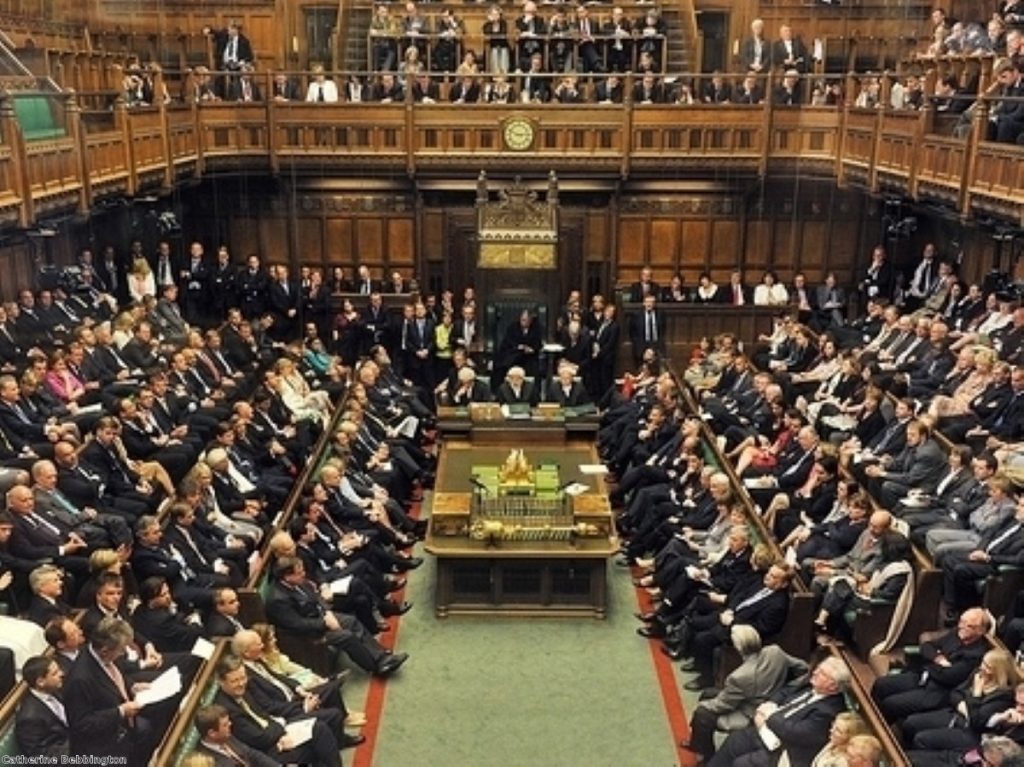50 shades of denial: MPs fail the Maria Miller test
Politicians are displaying an almost heroic stupidity in failing to realise the blinding obvious: the public simply doesn't trust them to judge their colleagues.
If there's one thing the Maria Miller scandal should have taught them, it's that the discredited standards and privileges committee has to be reformed – and urgently.
As has become clear today, there's not a chance of this happening.
After Speaker John Bercow finally saw sense and let Labour backbencher John Mann raise the issue in the Commons, the stage was set for what could have been a constructive exchange of views about how best to restore public trust.
This was always going to be laughable, though. Acknowledging something needs to change would mean accepting the premise that the committee of MPs who made Maria Miller pay back nearly £6,000 of overclaimed expenses last week might have actually done a bad job.
Westminster has that peculiarly charged atmosphere of excitement which always builds up whenever a minister is in danger of resigning. So large swathes of the government benches were never going to do anything other than rubbish Mann's calls for reform.
Being in denial took on different forms. Sir Gerald Howarth blamed the media. "This is not so much a failure of the system as a complete and abject failure of the media to report their [the committee's] views objectively," he declared. The general view was that journalists had somehow succumbed to a collective laziness and failed to properly describe the standard committee's report. The only conclusion to be drawn, according to Labour veteran David Winnick, was that the whole affair had somehow been "got up by the media".
Another way out of this mess was the suggestion that the public don't care about it. Peter Bone even ventured to suggest he had been out speaking to voters all weekend, and none of them had mentioned the Miller case. This seemed just a little unbelievable – as fellow Tory backbencher Matthew Offord pointed out. The truth, as Paul Flynn explained to this unbelieving audience, is the public have a "very powerful impression of sleaze in this House which is very damaging". Flynn is like a Shakespearean fool: he speaks a lot of sense, but no-one pays any attention because he's too left-field to be permitted the time of day.
What about the government? Its position, just as encumbered by the need to protect Miller, is crammed full of legalese about protecting parliamentary privilege. The crux of the argument rests on the importance of preserving the Commons from the interference of the courts – as leader of the House Andrew Lansley explained. He adopted the kind of patient, reasonable tone which civil servants use to sedate worked-up ministers. He was even open to ideas. But the government is not straining at the leash to come up with its own solution. It may be prepared to budge an inch on the role of lay members – or 'blokes off the street' – but there will be no meaningful change.
Kevin Barron, the chair of the standards committee, stood up to deliver a defiant statement. He seemed personally affronted by the row that his committee of MPs would do anything other than the right thing. It was a case of wounded honour prompting a bristling temper. He shouted out his defensive keywords "impartial!" – "fair!" – "non-partisan!" – like a clay pigeon shooter blasting criticisms out of the air. Other senior parliamentarians followed suit.
The only dissenting voice on the Tory benches was that of Jacob Rees-Mogg, who deviated from the script with such adroit smoothness that had he been an assassin Maria Miller would never have felt the blade sliding between her ribs. He wanted either a "direct" version of recall (which isn't going to happen) or, preferably, a chance to allow the whole House to overturn the standard committee's findings and come up with its own, "more robust", conclusions. Rees-Mogg sits at the far end of the Commons – as close as possible to another planet as it is possible to be in the chamber. So he probably couldn't hear the mutterings of horror emanating from the Cameron loyalists sitting behind Lansley.
Those talking sense were in a real minority. Peter Hain, the former leader of the House, uttered the wisest words of the session. "The truth is the public think there is one rule for them and another rule for us," he declared. "There must be a solution… otherwise, frankly, we are not going to be in a credible position."
If the Commons is going to come up with an answer it's not going to do so while that great static charge of Maria Miller's future continues to crackle around parliament. The partisan message from Angela Eagle, Lansley's shadow, was that "a committee of MPs has let her get away with it". It seemed odd Speaker John Bercow waited a few minutes before reminding MPs that the rules of the day stated they weren't allowed to debate Miller's conduct.
Outside the Commons chamber afterwards I spoke to a number of the backbenchers who had been present. Some were determined to pretend the last 45 minutes hadn't taken place at all. Others viewed it as a whitewash. One Lib Dem veteran revealed that Eagle's suggestion that the government should voluntarily remove its majority on the standards committee rang hollow – because the New Labour government had refused to make such a change. Whichever party is in power, the government always wins.
Miller's survival is still an open question, but the idea of meaningful changes to the standards committee is plain laughable. "This place is a gentleman's club – they've just been closing ranks on us," one Labour MP said. The only conclusion is that Westminster politicians doesn't seem to care what the public think.





-01.png)